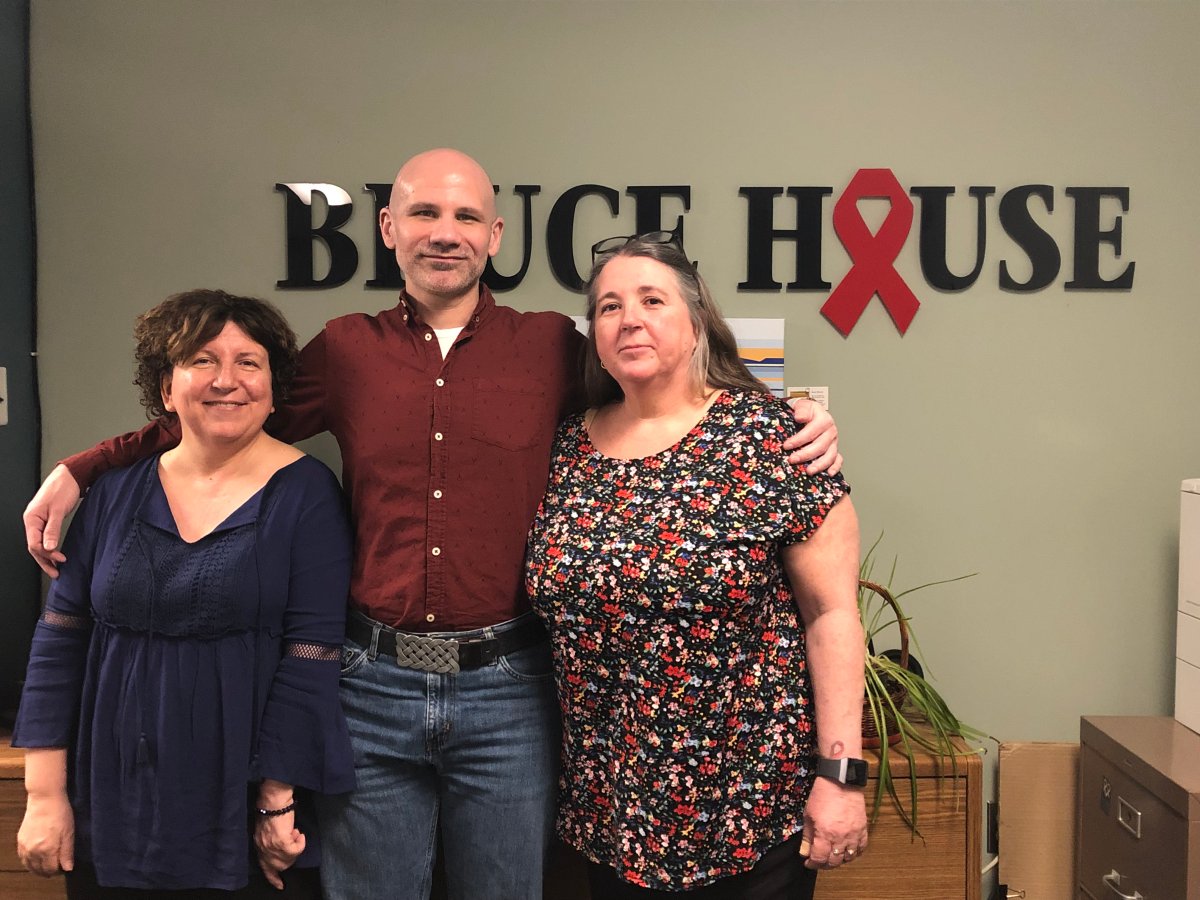About one year ago, when Bruce House was officially cut off from the federal funding on which it relied heavily every year to support Ottawa residents living with HIV and AIDS, staff didn’t know what the future would hold.

Now, the community-based organization is breathing a bit easier after receiving a $25,000 grant late last year that is helping to sustain two of its key programs and even expand them a bit — at least, until November.
Bruce House employee Sam Taylor co-ordinates one of those programs: the rehabilitation and episodic supportive transition (REST) program, which provides individualized short- and long-term assistance to clients who are living independently but may be going through an episodic crisis or need help accomplishing daily activities, like grocery shopping or medical appointments.
Taylor described the new funding as “a big relief” for the organization’s staff and, in turn, its approximately 100 clients.
“They know they can turn to us, and we can support and we can offer them what they need,” she said.
“It’s wonderful… it’s a cushion.”
Back in 2016, the Public Health Agency of Canada made changes to who would be eligible for its HIV-AIDS funding, shifting its focus to prevention and education initiatives. For dozens of organizations and non-profits who offer programs and support services for those already living with the virus — it’s estimated that 3,600 individuals in Ottawa have HIV-AIDS — this decision spelled bad news.
About a third of Canada’s community-based HIV-AIDS groups lost tens or hundreds of thousands of dollars each in annual funding as a result. The federal government provided the groups whose funding wasn’t renewed with transition money, which then expired on March 31, 2018.

The months that followed were difficult, Bruce House staff said in an interview with Global News last week.
“We were very limited in what we could do,” said Lorraine Kelly, manager of finance and administration. “We still did as much as we could but … we couldn’t expand on client services.”

Get breaking National news
Their situation took a turn for the better, however, after Bruce House applied for and scored a $25,000 grant from ViiV Healthcare Canada, a pharmaceutical company that focuses on HIV-AIDS research and treatment and financially supports “community-based initiatives that improve outcomes for people living with HIV-AIDS in Canada” through a special funding stream.
Funding kick-starts art program, boosts social events and volunteer training
As a direct result of the grant, Bruce House has been able to expand the services it offers through the REST program — a cornerstone of the organization that also aims to provide respite opportunities for clients’ caregivers.
Staff launched a new art program and also revived a handful of social events, including trivia and bingo nights as well as a community kitchen program where staff and clients cook meals together.
“It’s all to get clients out to prevent isolation, especially over the winter when the weather’s so terrible,” Taylor said.
Part of the grant will also be used to train more volunteers for Bruce House’s buddy program, which matches a client to a volunteer, who then might meet once a week or so to grab a coffee, catch a movie or visit a museum. Plans to expand the buddy program were postponed when Bruce House learned its federal funding had dried up.
Staff said the program is in high demand, but it can cost up to $500 to train every new volunteer. The buddy program is currently about 25 volunteers strong and Bruce House hopes to train another 10 to 15 new buddies with the extra cash.
Client Dominique Grondin said he doesn’t know where he’d be today without Bruce House’s programs, calling his buddy Dylan Ryan “the best buddy in the world.”
“I don’t know how to say it, but it saved my life,” said Grondin, who has been registered with the organization for about four years.
“I think Bruce House is essential services … because even in 2019, to be [HIV positive]… people still ostracize us.”
Grondin said he also “loves” the new art program and the community kitchen events, which help “kick” him out of his apartment and allow him to meet new people and work with them on a “common project.” He enthusiastically displayed some of his creations from the art program, which included collages, paintings, string art and a homemade clock.
On top of their programming, Bruce House likes to keep non-perishable foods and transit fares handy for clients in need. Staff said they ran out of these items regularly last year but are now confident the shelves can stay stocked with the grant from ViiV.
“There’s less saying ‘no,'” said Patrick James Morley, Bruce House’s office and communications co-ordinator.
Lack of long-term funding leaves non-profits perpetually ‘scrambling’
While staff said the $25,000 grant is making a tangible difference, it represents between third and a quarter of the annual funding Bruce House used to receive from the federal government, according to Kelly.
Bruce House is making up the difference through other small grants and donations. While this keeps their “heads above water” in the short term, staff lamented the disappearance of stable funding that allows non-profits like theirs to plan for the long-term.
“It’s a bit like clipping coupons each week so you can afford the groceries,” Morley said.

The organization leans on a crew of about 150 volunteers to help with administrative and fundraising work, staff said.
Bruce House’s annual budget is just above $770,000 but about $208,000 of that is “variable,” according to Kelly. The ViiV money, for example, is a one-time grant that runs out in November and the organization plans to re-apply for it, she said.
“We’re always looking for additional funding,” Kelly said.
“We’re down to the bare bones.”










Comments